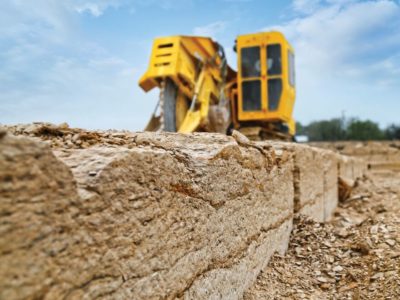Updated July 7, 2022
Working in rock conditions is a precise process. This is true whether you’re performing continuous surface mining with a Vermeer Terrain Leveler® surface excavation machine (SEM), or installing utilities with Vermeer trenchers, rockwheels and horizontal directional drills (HDDs). The more you know about the rock you’re working in, the more you can know about your machine, estimate production and boost efficiency.
Back in 2000, Vermeer made a significant investment to enhance its rock testing capabilities. To understand the tough rock conditions customers face on their jobsites, Vermeer enhanced its rock testing capabilities in 2006 by creating the Vermeer Rock Lab. The lab follows U.S. and international geological society standards to provide customers with crucial information about their jobsite. Rocks arrive daily for the lab to analyze. To date, the rock lab has tested thousands of rock samples from customers and local dealers across the world.
Rock tests
It all begins with rock samples. It’s important to get samples from many parts of the jobsite to account for differing rock conditions. Each basketball-sized sample is cored into a cylinder 2.1-in (54-mm) in diameter and 4.3-in (108-mm) in length. This core size with a 2-to-1 ratio follows the American Society for Testing and Materials (ASTM) standards and prepares the sample for the following tests.
The sample undergoes the Unconfined Compressive Strength (UCS) test to determine the compression strength, or hardness, of the rock.
The CERCHAR abrasivity test is also performed to determine the potential wear of rotary cutting teeth when mining, drilling or trenching in this condition.
The Vermeer Rock Lab also developed the Vermeer Energy Index test to further understand how brittle or ductile the rock is and how it correlates to productivity of Vermeer machines.
Customers then receive the laboratory test results as a written report.
Pushing a pencil
At this point, the cost of operation and cost per ton when using a machine in the tested rock can be estimated by using a solutions calculator by inputting the results of the rock testing and many other jobsite-specific factors.
Based on the rock hardness and energy, the production rate of operating in that rock is also estimated. Then, cost per cubic meter or cubic yard and cost per ton can be estimated using ownership costs and production rate.
Because the input is specific to the findings of the tested rock samples, you only get the information you need to know for your jobsite.
What’s the value?
You can learn a lot about your jobsite from a few basketball-sized rocks with the help of the Vermeer Rock Lab. With that information, you’ll get help determining the appropriate tooling to use for the ground conditions and be able to make more informed business decisions. Vermeer Rock Lab services are available at no cost to Vermeer customers.
If you’re looking to invest in a new piece of equipment to tackle your rocky jobsite, reach out to your local Vermeer dealer about collecting representative rock samples and using the Vermeer Rock Lab.
The costs and production rates, as calculated by the solutions calculator, are only estimates. The actual amounts will vary based upon your conditions, maintenance, operator experience, site preparation and many other factors. This is only a tool for estimating. The actual production rates and costs will vary. Vermeer Corporation reserves the right to make changes in product engineering, design and specifications; add improvements; or discontinue manufacturing or distribution at any time without notice or obligation. Equipment shown is for illustrative purposes only and may display optional accessories or components specific to their global region. Please contact your local Vermeer dealer for more information on machine specifications.
Vermeer and the Vermeer logo are trademarks of Vermeer Manufacturing Company in the U.S. and/or other countries. © 2022 Vermeer Corporation. All Rights Reserved.
